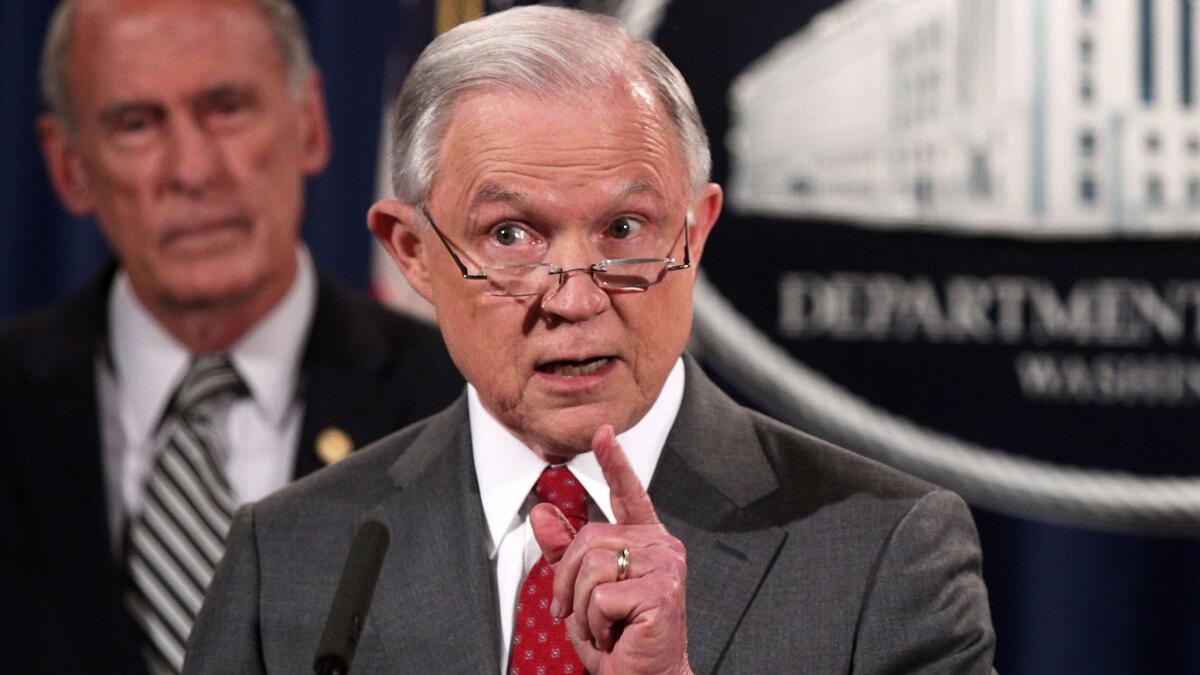Editorial: Don’t make the press collateral damage in a war on leaks

Insisting that a “culture of leaking” in the federal government must stop, Atty. Gen. Jeff Sessions on Friday said that the Trump Justice Department had more than tripled the number of leak investigations it was conducting since the end of the Obama administration. That’s a striking increase, considering that the Obama administration also zealously went after leakers (something Sessions failed to mention).
Cynics will see Sessions’ statement as a cave-in to public complaints by President Trump that his attorney general hasn’t been tough enough on leaks, but we don’t doubt Sessions’ sincerity. Although leaks can help protect the public against deception and abuses of authority, they also can pose real problems for the government, even when — as in the case of the publication of transcripts of Trump’s telephone conversations with two foreign leaders — they don’t compromise national security.
We are alarmed, however, by Sessions’ suggestion that, in investigating leaks, he might be willing to relax Justice Department restrictions on seeking information from reporters. The attorney general said that, at the suggestion of career investigators and prosecutors, he and his staff were reviewing policies affecting subpoenas of members of the news media.
“We respect the key role that the press plays and will give them respect,” Sessions said, “but it is not unlimited. They cannot place lives at risk with impunity. We must balance their role with protecting our national security and the lives of those who serve in our intelligence community, the armed forces, and all law-abiding Americans.”
Sessions seems to have misread the department’s current guidelines. As revised by former Atty. Gen. Eric H. Holder Jr. in 2015, they’re designed not to subordinate national security or law enforcement to the fourth estate’s hunger for scoops. Instead, they seek to strike a balance between security interests and the public’s need for a free press that holds government accountable.
They do so by allowing federal investigators to subpoena news organizations for information only “after all reasonable alternative attempts have been made to obtain the information from alternative sources” and only with the permission of the attorney general or another senior official. Sensibly, the guidelines say that subpoenas and search warrants directed at the news media should be “extraordinary measures, not standard investigatory practices.” If Sessions has any evidence that adhering to these guidelines has jeopardized the lives of FBI agents, intelligence officers or U.S. troops, he should offer it.
It might sound like special pleading for a newspaper editorial page to defend arrangements that protect our profession. But society as a whole benefits when the press is protected from being casually conscripted by government investigators. In seeking to prevent leaks, the Trump administration should focus on keeping its own house in order.
Follow the Opinion section on Twitter @latimesopinionand Facebook
More to Read
A cure for the common opinion
Get thought-provoking perspectives with our weekly newsletter.
You may occasionally receive promotional content from the Los Angeles Times.






